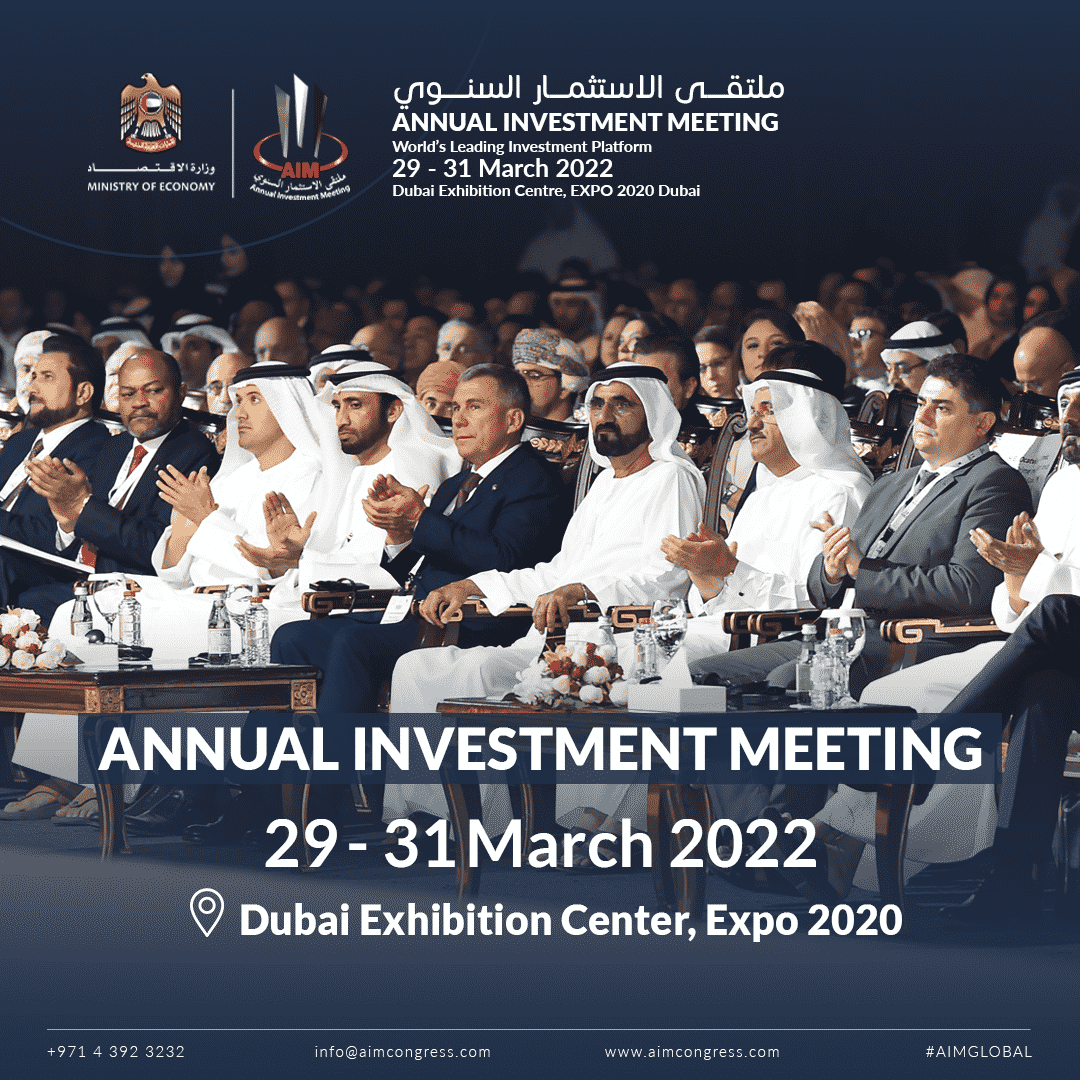International participations of more than 174 countries demonstrate global economic recovery post Covid-19
Expo 2020 Dubai, UAE, 29 March 2022: Held under the patronage of HH Sheikh Mohammed bin Rashid Al Maktoum, Vice President and Prime Minister of the UAE, Ruler of Dubai, the Annual Investment Meeting (AIM 2022) was inaugurated today (Tuesday, March 29th, 2022) by HE Abdulla Bin Touq Al Marri, UAE Minister of Economy at the Dubai Exhibition Centre, Expo 2020 Dubai where it was attended by representatives of official delegations and participants from more than 174 countries.
The strong response on the first day of AIM was a barometer of the global economic recovery post Covid-19 as well as the UAE’s global position as a hotspot for investments across the investor spectrum.
Day one of AIM focused on the latest trends in foreign direct investment (FDI) and its growth prospects in emerging markets and the importance of attracting foreign investment driven by a progressive mix of legislation and flexibility in emerging markets.
AIM 2022 presented a platform for decisions makers, officials, investors, entrepreneurs, experts, analysts and academics who gathered under one roof to discuss FDI challenges, potential and growth.
Participants in AIM 2022 had the opportunity on day one to hold meetings, make contacts and share expertise with peers from all over the world. A variety of sessions were held on the first day.
The first day of the three-day event brought together investors, venture capitalists and financial institutions under one roof to participate in discussions, debates and much more.
Day one started with a debate focusing on ‘Investments in Sustainable Innovation for a Thriving Future’, as dignitaries, delegates and the keen-minded alike converged at the Dubai Exhibition Centre.
“Investments in future come at a time when the global investment landscape is changing rapidly thanks to an array of factors such as post pandemic trends, economic priorities and digital revolution; but one fact remains unchanged, FDI plays a significant role in the continuing efforts to achieve economic growth and prosperity,” said HE Abdulla Bin Touq Al Marri, UAE Minister of Economy.
The Vice President of Colombia, HE Dr Martha Lucia Ramirez kicked off the debate as she highlighted the need for “sustainable innovation” and an improvement in the global supply chain, focusing on a more “integrated” solution.
Shifting focus across the region, HE Rebeca Grynspan, Secretary General, United Nations Conference on Trade and Development (UNCTAD) expressed her concern on the lack of development and aid provided to developing countries. “In the developed world recovery went up to 30 per cent but in developing countries only 20 per cent. Developing countries are lagging behind in terms of investment in very important sectors.”
HE Vera Songwe, Under-Secretary-General, United Nations and Executive Secretary, Economic Commission of Africa started off by congratulating Dubai on a “fantastic EXPO” and further added on the “peculiarities” that the African continent faces post pandemic.
“All the ecosystems that support the investment is available in Abu Dhabi that boasts a strong and flexible platform not to mention the easiness of starting businesses. Just plug the business into one of the ecosystems in Abu Dhabi,” said HE Rashed Abdulkarim Al Blooshi, Undersecretary, Abu Dhabi Department of Economic Development.
The debate concluded with the President of the Republic of Tartastan, His Excellency Rustam Minnikhanov, as he highlighted how AIM was progressively gaining traction every year.
“The Annual Investment Meeting is a great platform for us to present investment opportunities for our region, exchange best practices with foreign partners, and make new contacts. Today we heard some informative and engaging discussions and expert opinions addressing a highly important topic of “Investment in Sustainable Innovation for a Thriving Future,” he said.
News of the event has quickly spread with technology and sustainability-driven companies and firms endeavouring to network at AIM 2022. With an hour dedicated to networking over lunch after the debate, high network individuals and company representatives can bolster their corporate framework and build relationships that could help boost business.
“We are looking forward to meeting global startups and entrepreneurs at AIM 2022 and providing them with the market knowledge to propel their startups and take them to the next level and give them not only scalability but the right amount of scaling. Additionally, this is a good opportunity to partner with governments and VCs too create co-investment opportunities to support the UAE startup ecosystem,” said Varis Sayed, Chief Executive Officer at Fincasa Ventures.
Currently, the UAE sits among the top 20 economies for FDI in the world, increasing by 4% year on year. The UAE has set an example by combating every challenge and turning it into an opportunity. Furthermore, the nation has developed its economic sectors to achieve qualitative shifts to a newer and more sustainable economic model, cementing itself as one of the top global economies in the world.










